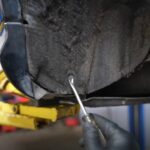Computer Diagnostic For Cars has revolutionized the automotive repair industry. This technology allows mechanics to quickly and accurately diagnose car problems, saving time and money. This article delves into what computer diagnostics entail, how they work, their benefits, and why they are crucial for modern vehicle maintenance.
Understanding Car Computer Diagnostics
Computer diagnostic for cars involves using specialized software and hardware to communicate with a vehicle’s onboard computer system. This system, often referred to as the Engine Control Unit (ECU), continuously monitors various sensors throughout the vehicle, collecting data on engine performance, emissions, transmission function, and more. Diagnostic tools allow mechanics to access this data and interpret Diagnostic Trouble Codes (DTCs).
Decoding Diagnostic Trouble Codes (DTCs)
DTCs are alphanumeric codes that indicate specific malfunctions detected by the vehicle’s computer system. When a problem is detected, the ECU stores a corresponding DTC, which can be retrieved using a diagnostic scanner. These codes act as a starting point for troubleshooting, providing clues about the nature and location of the problem.
Here are a few examples of common DTCs:
- P0300: Random/Multiple Cylinder Misfire Detected. This code suggests issues with spark plugs, ignition coils, fuel injectors, or compression.
- P0420: Catalyst System Efficiency Below Threshold (Bank 1). This indicates a problem with the catalytic converter or related components like oxygen sensors.
- P0171: System Too Lean (Bank 1). This points to an imbalance in the air-fuel mixture, potentially caused by vacuum leaks, faulty mass airflow sensors, or fuel delivery problems.
The Advantages of Computer Diagnostic for Cars
Precise and Efficient Diagnosis
Computer diagnostics provide a level of precision unmatched by traditional diagnostic methods. By analyzing data directly from the vehicle’s computer, mechanics can pinpoint the root cause of a problem quickly and accurately, eliminating guesswork and unnecessary repairs. This efficiency translates to significant time savings for both the mechanic and the car owner.
Comprehensive System Analysis
Modern vehicles are complex systems with interconnected components. Computer diagnostics enable a comprehensive analysis of these systems, identifying potential issues that might be missed during a visual inspection. This holistic approach ensures that all aspects of the vehicle’s performance are evaluated.
Proactive Maintenance and Prevention
Regular computer diagnostics can identify minor problems before they escalate into major and costly repairs. By detecting early warning signs, such as unusual sensor readings or performance deviations, mechanics can perform preventative maintenance, extending the life of vehicle components and ensuring optimal performance.
Is Computer Diagnostic for Cars Necessary?
In today’s automotive landscape, computer diagnostic for cars is essential for effective vehicle maintenance and repair. The complexity of modern vehicles demands the precision and comprehensive analysis that only computer diagnostics can provide. While some minor issues might be diagnosed using traditional methods, relying solely on these methods can lead to misdiagnosis, wasted time, and unnecessary expenses. Computer diagnostics offer a proactive approach to car care, ensuring vehicle reliability, safety, and longevity.
Conclusion
Computer diagnostic for cars is no longer a luxury but a necessity for modern vehicle repair. Its ability to provide accurate, comprehensive, and efficient diagnoses makes it an invaluable tool for mechanics. By leveraging the power of computer diagnostics, car owners can benefit from faster repairs, reduced costs, and improved vehicle reliability. Regular computer diagnostic scans are a crucial part of preventative maintenance, helping to identify potential problems early and keep your car running smoothly.
